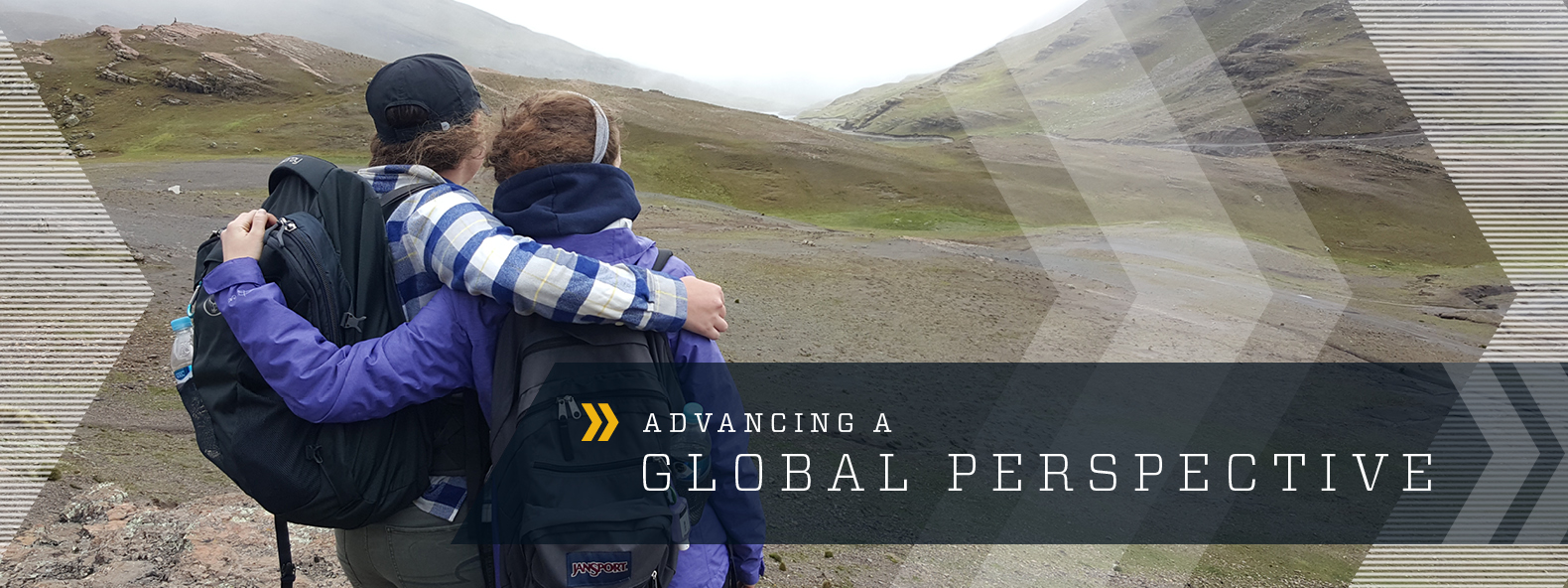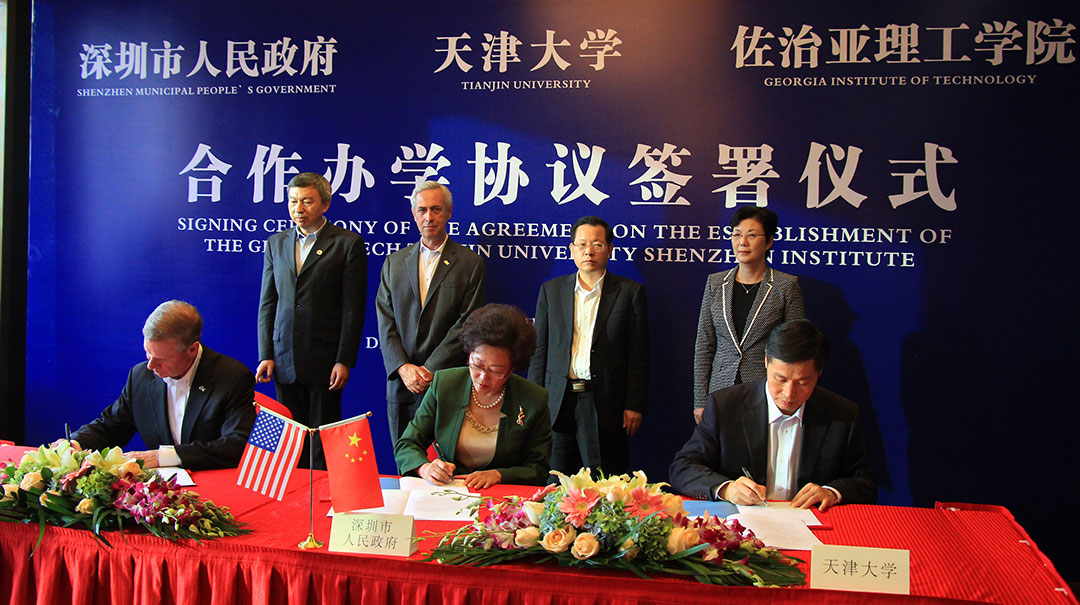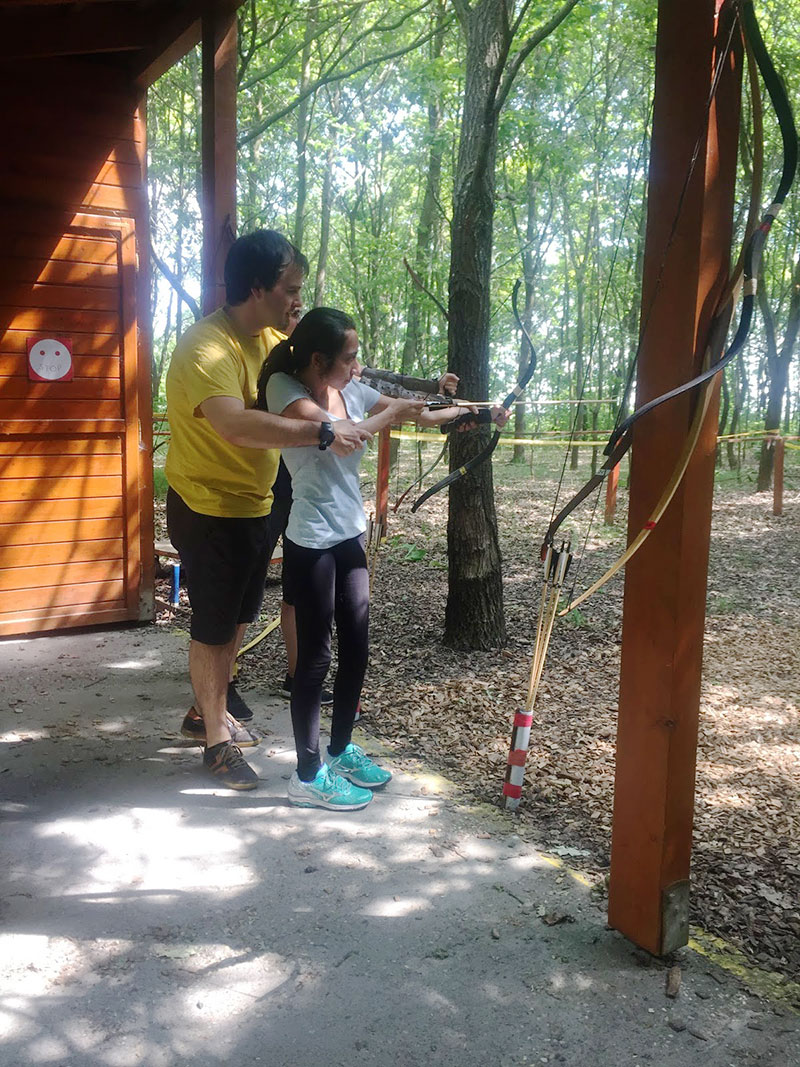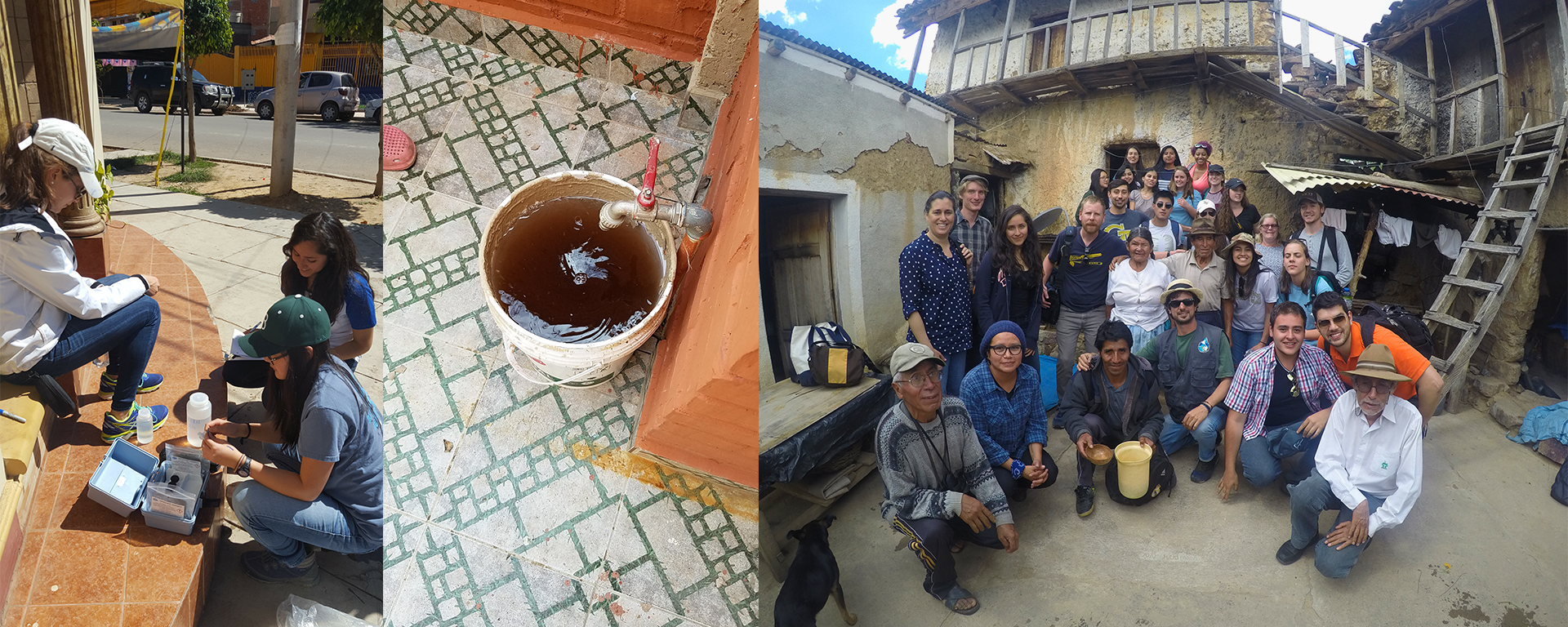
Annual Report 2017 Navigation
Advancing a Global Perspective
Engaging with education, research, and innovation partners around the world is a primary source of Georgia Tech’s strength and ongoing vitality.

Georgia Tech President G.P. “Bud” Peterson, seated left, signed an agreement in a ceremony in Shenzhen, China, on Dec. 2, 2016, to create a new collaboration with the city of Shenzhen and Tianjin University. Co-signers with Peterson are Vice Mayor Yihuan Wu of Shenzhen Municipal People's Government, center, and Tianjin University President Denghua Zhong, right.
Shenzhen Partnership Advances Key Strategic Relationships
A new educational collaboration among Georgia Tech, the city of Shenzhen, and Tianjin University in China will expand global opportunities in science, technology, and engineering education. President G.P. “Bud” Peterson signed the collaboration agreement in a ceremony in Shenzhen last fall.
The Georgia Tech Tianjin University Shenzhen Institute offers majors in electrical and computer engineering, computer science, industrial design, environmental engineering, and analytics. Georgia Tech coordinates the graduate programs at the specialized institute, while Tianjin University, China’s oldest university, coordinates the undergraduate programs.
The Shenzhen government provided land, startup funding, and operational subsidies. The vision is that the specialized institute will enroll 800 undergraduate and graduate students from throughout the world by 2020, and 3,000 students by 2030. It will present new opportunities for U.S.-based students, including study abroad programs and internships, and will expand Georgia Tech’s China Summer Program.
“This historic agreement is in alignment with Georgia Tech’s focus on internationalization, as outlined in our 25-year Strategic Plan,” said Peterson. “It will serve as a great vehicle to engage our strong alumni base in China and increase Georgia Tech’s global reputation as a leading technological research institution.”
“This historic agreement is in alignment with Georgia Tech’s focus on internationalization, as outlined in our 25-year Strategic Plan.”
G.P. “Bud” Peterson
“Having a full international campus is unusual, and we only do that when there is a compelling reason to benefit the institutions involved, as well as to provide a unique educational experience for students,” said Rafael L. Bras, provost and executive vice president for Academic Affairs and the K. Harrison Brown Family Chair. “Today’s agreement marks such an opportunity.”
Shenzhen is China’s high-tech capital and is often referred to as the “Silicon Valley of China.”
“This initiative was spearheaded by Professor G. Tong Zhou, associate vice provost for International Initiatives, and represents an exciting opportunity for Georgia Tech to be present in one of the fastest-growing technological centers of China,” said Yves Berthelot, vice provost for International Initiatives. “Educational and research programs, combined with internships, will be tremendously beneficial to our students.”
Future plans for the Georgia Tech Tianjin University Shenzhen Institute include developing major research centers led by world-renowned Georgia Tech faculty.

Students spent the first week in Budapest visiting Bator Tabor, a therapeutic recreation camp for children living with cancer or other chronic illnesses. Photo by Carlin Zaprowski.
Social Entrepreneurship Is Topic of Studies in Eastern Europe
Every summer, through the Leadership for Social Good Study Abroad Program, faculty and staff of the Institute for Leadership and Entrepreneurship (ILE) lead a group of undergraduates on an educational experience in Hungary, Poland, and the Czech Republic.
Through classroom lectures, site visits, and close work with nonprofits, students learn how social enterprises and nonprofit institutions work and what type of leadership is effective in this sector.
This past year, students spent the first week in Budapest, Hungary, visiting Bator Tabor, a therapeutic recreation camp for children living with cancer or other chronic illnesses.
“Hearing the impact and experiencing the impact [an organization has] is very different,” said Manaka Sato, a biomedical engineering major. “Our group had the opportunity to experience some of the influence that Bator Tabor has on the seriously ill children firsthand.”
During the five weeks that the students spent in Budapest working with nonprofit organizations, they had the opportunity to see how the theory they learned in the classroom worked in practice, witness the challenges small organizations face on a daily basis, and contribute to solving those problems.
Alternative Service Break Efforts Continue to Grow
Each year, the number of Tech students choosing to devote their spring breaks to service-learning projects increases. Locations for service projects last spring included U.S. sites as well as Central America and South America.
Bolivia
Joe Brown, assistant professor in the School of Civil and Environmental Engineering, traveled with students from his CEE 4350 course, Environmental Technology in the Developing World, to Cochambamba, Bolivia. The water quality-focused research trip included a group of 10 students and two teaching assistants.
Over 10 days, the group worked with local partners in Bolivia to conduct water quality surveys. The Catholic University of Bolivia joined with Tech students for a cultural and scientific exchange.
This course runs in parallel with similar courses at Duke University and Yale University. At the end of the semester, the three classes met at a research conference in New York to present their findings.
“Georgia Tech truly is a diverse school, and this trip reminded me of just how important diversity is in the world.”
Michael Bryan
Costa Rica
Third-year chemical engineering major Allison Sellers led a trip to Costa Rica. A team of 14 traveled to the Central American country to work on a sea turtle rescue project with Community Collaborations. In their free time, group members participated in canopy tours and rainforest hikes.
“I was excited about leading the trip to Costa Rica because I’m passionate about the environment and traveling abroad,” Sellers said. “This trip was unique because of its purpose and international destination.”
Sellers has attended service break trips since her first year at Tech. She was involved with service work throughout high school.
Florida
The Office of International Education (OIE) and Serve-Learn-Sustain partnered to host an Alternative Service Break trip to DeFuniak Springs, Florida. The trip provided an opportunity for participants to take part in an environmental service project near the Gulf Coast. More than 40 students from the U.S. and around the world participated.
This year’s trip supported the Living Shoreline, a conservation project used in coastal regions to help promote the growth of micro-ecosystems and reduce erosion. It includes the bagging of fossilized oysters, which are strategically placed along beaches to help build up sand pockets, slowing the effects of erosion.
“My favorite memory from this trip was on the bus ride from dinner one evening,” said Michael Bryan, an undergraduate environmental engineering major. “Every person on the bus representing a cultural region performed a song in their language — performances from Russia, Spain, China, Singapore, India, America, the list goes on. At no other point on the trip did I feel more connected with this group, and I am truly glad for this experience. Georgia Tech truly is a diverse school, and this trip reminded me of just how important diversity is in the world.”
Olympic Swimming Team Practices in Aquatic Center
Last summer the McAuley Aquatic Center hosted the U.S. Olympic diving and swimming teams leading up to the 2016 Summer Games in Rio de Janeiro, Brazil, providing the campus community and the public an opportunity to see them practice and get autographs.
The USA Diving Team hosted a send-off celebration that included open practices, team-building exercises, and visits to local children’s hospitals. The events also included members of the 1996 Diving Team from the Atlanta Olympics.
Annual Report 2017 Navigation
(text and background only visible when logged in)

